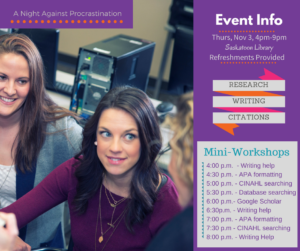by Tasha Maddison, Becky Szeman and Nina Verishagen
Saskatoon Campus, Saskatchewan Polytechnic
Saskatchewan Polytechnic has four campuses located throughout the Province of Saskatchewan. In 2015/16 our student population was listed at over 14,000 (Saskatchewan Polytechnic, 2015). The institution offers an array of scholastic options in certificate, diploma and degree programs. Students have access to a variety of supports such as counselling, research help and learning services (tutoring). In 2014, faculty from learning services approached a librarian about partnering up to host an event with the mission of providing students with just-in-time help for research assignments: a Night against Procrastination (NAP).
Although the event was open to all students at the Saskatoon campus, the 2014 organizers developed it to fit into the schedule of nursing students who had a major paper due that semester. It happened that during this busy time of year, the two departments were having a difficult time keeping up with students’ individual requests for help. The inaugural event was held in early November from 4:00 pm – 11:00 pm in the library’s computer lab. Students were invited to enjoy food and one-on-one homework help. This event was a success with more than 40 attendees.
The following year, to entice students from other programs to attend NAP, the organizers hosted multiple events at different times. Despite the changes, attendance dwindled with approximately 20 students attending all events. But on a positive note, we did see a more diverse set of students attending from various programs.
For our latest iteration of NAP, in 2016, our mission was two-fold: revisit the events original intent of focusing on nursing students and diversify our service offering to make it more accessible to all students. At our initial planning meeting, we discussed strategies to achieve these goals. They included, continuing to provide snacks, sitting at an Ask Us table, extending the event beyond the computer lab to the whole library, and offering mini workshops.
Successes:
We had an overabundance of snacks, so we decided to tour the library and hand them out to students. This was an unexpected success, as it opened the event to students who were present in the library, but were not there to attend NAP. We soon discovered that students were more likely to ask us questions if we approached them, organically making our snack giveaway a Roving Reference Service. Helping students where they had set up for the night led to more interactions than if we had stayed in one spot. We have carried this technique over into our recent ‘Stress Better’ event in which distributed food to students studying for exams.
Students also responded well to the Ask Us table with many approaching us at the table with their laptops in hand. Librarians responded to a total of 21 APA (references and formatting) questions, while learning services reviewed papers and offered writing support for 9 students.
Lessons Learned:
Students prefer the option of seeking one-on-one help. We had planned to host 15 minute mini workshops in the computer lab during the event but there was no uptake at all. The nursing students had already attended a 3-hour research intensive and in most cases their paper was almost complete; what they required was assistance in the last stages of editing.
Our promotion efforts fell short. We developed a web graphic for social media which received high engagement, sent an email directly to Faculty in research intensive programs, and had digital displays throughout the campus. We later learned, through anecdotal feedback, that the design (see below) might have led the students to believe that we were only hosting mini workshops and not providing one-on-one help. In addition to a graphic redesign, there are many other communication tools available at our institution that could have been utilized and we will be considering them for future events.
Final Thoughts:
Even though attendance has not increased since 2014, we feel that it is still worth doing. At our institution, students typically don’t have lengthy breaks throughout their day, and therefore, they are often unable to access librarians who work regular hours. With this event, we were able to offer students assistance at their time of need which may have reduced their anxiety. Helping even a few students improve their academic performance fulfills both our library and professional goals. We feel confident about this as a few of the attendees approached us at the end of the night and asked that we provide this sort of service more often, solidifying our certainty in this event’s value to our students.
The authors wish to acknowledge Chau Ha who initiated and hosted the event in 2014 and 2015. We also wish to recognize Margaret Campbell and Susan Healey who have partnered with us each year from Learning Services.
References
Saskatchewan Polytechnic. (2015). Quick facts about Saskatchewan Polytechnic. Retrieved from http://saskpolytech.ca/about/about-us/quick-facts.aspx
This article gives the views of the author(s) and not necessarily the views of the Centre for Evidence Based Library and Information Practice or the University Library, University of Saskatchewan.


